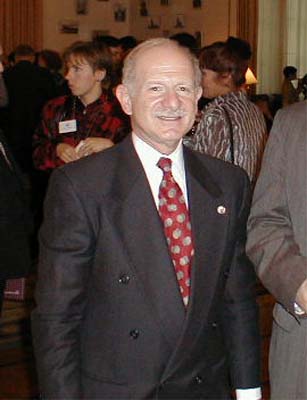
Former Director Mark Schneider, to testify on Afghanistan Constitution and Prospects for Democracy at House Committee on International Relations
NEWS ADVISORY
Committee on International Relations
U.S. House of Representatives
Henry J. Hyde, Chairman
CONTACT: Sam Stratman, (202) 226-7875, November 18, 2003
For IMMEDIATE Release Afghanistan Constitution and Prospects for Democracy
HIRC hearing on political developments scheduled Wednesday
BACKGROUND: The next major step in the political reconstruction of Afghanistan, as outlined by the Bonn Conference agreement of 2001, is adoption of a constitution in December and subsequent national elections for government leaders and parliament. The draft constitution, crafted by a 35-member commission, establishes a governmental structure with a strong elected presidency, subject to substantial checks and balances by an elected parliament. The draft sets up a two-chamber parliament, to be elected one year after the presidential elections. The draft gives the president the ability to appoint one-third of the seats for the upper chamber (Meshrano Jirga, House of Elders), and stipulates that half his appointments should be women. The lower house (Wolesi Jirga, House of People) is to be fully elected. The draft constitution designates former King Zahir Shah as ceremonial "father of the nation," but gives him no formal role in governance. The draft does not impose Sharia (Islamic law), but it does attempt to satisfy Afghanistan's conservative clerics by stipulating that laws should not contradict Islamic law. Protections for minorities are also written into the draft. However, some observers say the draft constitution does not provide sufficient protections for human rights, such as for freedom of speech and religion, and that it places the freedoms of Afghans in the hands of judges educated in Islamic law, rather than civil law.
WHAT: Joint subcommittee oversight hearing: Afghanistan: Democratization and Human Rights on the Eve of the Constitutional Loya Jirga
U.S. Rep. Ileana Ros-Lehtinen, Chair, Subcommittee on the Middle East and Central Asia
U.S. Rep. Elton Gallegly, Chairman, Subcommittee on Int'l Terrorism, Nonproliferation and Human Rights.
WHEN: 1:30 p.m., Wednesday, November 19, 2003
WHERE: 2172 Rayburn House Office Building
WITNESSES: Lorne W. Craner, Assistant Secretary, Bureau of Democracy, Human Rights and Labor, U.S. Dept of State; John C. Hanford III, Ambassador-at-Large, Office of International Religious Freedom, U.S. Dept. of State; Christina Rocca, Assistant Secretary, Bureau of South Asian Affairs, U.S. Dept. Of State; Mariam A. Nawabi, Legal Advisor to the Constitutional Drafting Commission of Afghanistan, Dechert, LLP; T. Kumar, Advocacy Director for Asia and Pacific, Amnesty International, U.S.A; Barbara Haig, Vice President of Programs, Planning and Evaluation, National Endowment for Democracy; and Mark Schneider, Senior Vice President, International Crisis Group.
Among the questions/issues expected to be addressed during the hearing:
On November 11, 2003, Ambassador Gunter Pleuger, head of the Security Council Mission to Afghanistan, said, "The conditions necessary for a credible national political process are not yet in place - national reconciliation requires greater focus; political parties need time to develop; national institutions must undergo reforms; and the power of factional leaders must be diminished." Does this mean that we should be pushing for further delays in the constitution ratification process and subsequent elections?
How does the draft Afghan constitution address the relationship between regional leaders and the central government?
According to the current draft of the Afghan constitution, who and what determines if certain laws or actions are contrary to the values of Islam?
Please address how the constitution in its present form protects religious freedom? To what extent are press freedoms practiced in Afghanistan? What measures are taken by the Afghan government to minimize intimidation/threats of journalists?
What progress has been made with regard to the role of rights of women in Afghanistan? How can opportunities for access to health care and education be encouraged and improved?
Are Congressional and United States' government priorities in Afghanistan in sync with the concerns of Afghans themselves?
